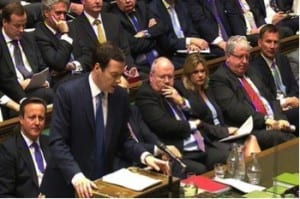 It was never going to be a case of ‘the axeman cometh’ given how close the general election is! Yet given how far ‘off plan’ the government is in terms of public finances, a ‘Santa Claus’ statement, full of politically expedient giveaways to woo the voters, also seemed impossible.
It was never going to be a case of ‘the axeman cometh’ given how close the general election is! Yet given how far ‘off plan’ the government is in terms of public finances, a ‘Santa Claus’ statement, full of politically expedient giveaways to woo the voters, also seemed impossible.
So how did the Chancellor do? Pretty well in my view. To begin with one clever coalition tradition was kept firmly alive; the leaking of many of the juicy details before the event. Political shrewdness of the highest order by both the Lib Dems and Conservatives, with nigh on a week’s worth of media coverage dominated by ‘good news’ statements.
The Conservatives were able to make a strong announcement of an extra £2.25 billion for frontline health spending and GP services, well ahead of the election. Liberal Democrat leader Nick Clegg was able to claim to be the man fulfilling Sir Alan Beith’s (Liberal Democrat MP for Berwick) 40 year dream of a ‘dualing’ the A1 North of Newcastle. Perhaps not quite the achievement he claimed it to be, but alongside a range of other infrastructure improvements, suspiciously near marginal constituencies, it was good news for the government.
The one major announcement that was kept back – stamp duty reform with 98% of buyers paying less – was a masterstroke, working on both policy and political level. We’ll most likely see house prices rising creating a feel good factor and positive economic news prior to the election. It also provides a credible, Conservative alternative to the ‘Mansion Tax’ – an ability to claim the coalition is doing something to ensure the wealthy bare their fair share of the burden.
The Labour Opposition counterattack has been surprisingly weak. George Osborne has frankly missed his targets massively; he has failed to meet the basic objective he set out at the beginning of the parliament of eliminating the deficit by the end of this term. Yet trying to attack the Chancellor on the economy seems to be like nailing jelly to the wall for Labour party. Osborne has a 20% lead over Ed Balls, his Labour opposite number, when it comes to who voters trust to run the economy.
While Ed Balls was able to make some serious points – an awful lot of “pre-heated re-announcements” did feature. The Office for Budget Responsibility data detailed that wages are stagnant and this has hit tax revenues – effectively confirming the Labour argument on the economy that for the vast majority living standards are falling and public services are perennially under threat. The Labour weakness seems to be the inability to turn any of this analysis into either their own positive economic narrative or land a lasting blow on the Coalition economic policy.
It falls to little known Liberal Democrat peer Lord Palumbo to come up with the stinging criticisms; “There’s no sanction for the government having missed all its economic targets in modern democratic politics. What are instantly sackable offences in the private sector are excused. We were promised a deficit of £35bn this year. It’s at £100bn.”
Perhaps, the real story though is less the good headlines generated by the Autumn Statement, but more the pressure the public finances are facing over the next several years. The independent think tank the Institute for Fiscal Studies said this morning just £35bn of cuts had already happened, with £55bn yet to come by the end of the next parliament. They argue, quite rightly, that this will require “a fundamental reimagining of the state.”
The response of all of the major parties, thus far, seems to be either to ignore the issue or downplay the extent of the issue the UK faces. Can this really last until the general election. I don’t think so; the UK public isn’t stupid, nor are our journalists – the party leaders and their top lieutenants are going to have to outline where, when and how they will make these cuts. They’ve got a few months to think about it but they need to come up with some compelling answers – and soon.


